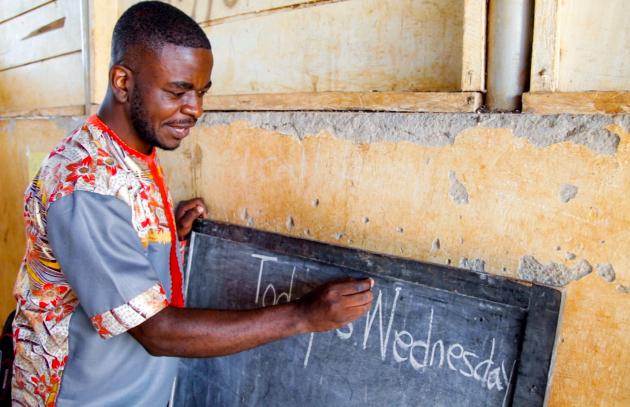spot_joel.01_02_26_23.still003.jpg

For the millions of children who are forcibly displaced, teachers are a vital source of learning, continuity, and inclusion. However, teachers working in refugee contexts also often face challenges and instability as members of affected communities. Without appropriate support and training, it can be challenging for these teachers as they navigate overcrowded, mixed-age, and multilingual classrooms.
Today, amid rising refugee populations, there is an urgent need for evidence to guide the development and implementation of policies for the effective management of teachers working with affected populations. A new study and a new policy brief are now out – focusing on teachers in refugee settings in Uganda, wrapping up a five-year multi-country exploration on teachers in refugee settings led by IIEP-UNESCO and Education Development Trust, and with support from Dubai Cares.
Often considered a model for progressive and inclusive refugee policies, Uganda has opened its borders to refugees for decades.
Similar to the additional case studies in Ethiopia, Kenya, and Jordan, the new study provides research-informed policy recommendations for more effective teacher management in refugee settings so that teachers are empowered, adequately recruited, well-trained, professionally qualified, motivated, and supported within well-resourced, efficient, and effectively governed systems, as set out in the Incheon Declaration & Framework for Action for the Implementation of Sustainable Development Goal 4.
The case study first builds an understanding of the policy landscape guiding the management of primary-level teachers in refugee settings in Uganda. At the national level, Uganda is widely recognized as having one of the most progressive refugee policies in the world. The research also explored perceptions of policy enactment, as well as levels of participation.
The study then explores who teaches refugees in Ugandan schools and how these teachers are managed in practice. For example, Ugandans comprise most of the teaching workforce in both refugee settlements and surrounding host communities and there is a shortage of female teachers in both settlements and host communities. Furthermore, refugees can secure formal employment as teachers, however, many remain as teaching assistants as they lack the documentation and/or qualifications.

Lastly, the case study identifies promising areas for further policy development and implementation to support effective teacher management in practice. For example, to address teacher professional development, refugee teachers should be able to upgrade their teaching qualifications. Faced with a shortage of accommodation, especially in hard-to-reach areas, the researchers recommend a plan for supporting teachers with accommodation and all salaries should be harmonized, regardless of whether the teacher is hired by the government or humanitarian partners.
By understanding the best policy options, teachers in refugee settings – in Uganda and all refugee-hosting contexts – can be sufficiently supported and nurtured as they accompany their students on their learning journey.
New! Policy brief on Ensuring effective teacher management in refugee settings in Uganda
This policy brief aims to provide research-informed policy guidance for the effective management of primary-level teachers in schools in refugee settings in Uganda. The guidance is intended to support the Ministry of Education and Sports (MoES) and other key stakeholders at multiple levels of governance with developing and implementing teacher management policies, with the overall goal of improving teacher management in refugee settings.









